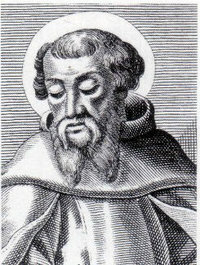Irenaeus
Irenaeus (130 - 202 AD) was an important early Christian who wrote against Gnosticism. He was originally from Asia Minor and later became Bishop of Lyon (South Gaul).
| Irenaeus | |
| RELATED TOPICS | |
| SERMONS, ESSAYS AND OPINIONS |
|
| CONTENTS | |
He was a strong opponent of Gnosticism, writing
- Refutation and Overthrow of the Knowledge Falsely So-Called (Other names: "Against Heresies" and "Five Books Against Heresies")
- Demonstration of Apostolic Faith
Traditionally, he is believed to have died a martyr's death.
This biographical article is a stub. You can help WikiChristian by expanding it
Contents
Quotes
Irenaeus Against Heresies, book 2: ch 34: para 1. Page 411 in ANF1, that is, Roberts A, Donaldson J and Coxe AC (1885) Ante-Nicene Fathers, Vol 1, at Christian Classics Ethereal Library. [c 185 AD.]
- The Lord has taught with very great fulness, that souls not only continue to exist, not by passing from body to body, but that they preserve the same form [in their separate state] as the body had to which they were adapted, and that they remember the deeds which they did in this state of existence, and from which they have now ceased, - in that narrative which is recorded respecting the rich man and that Lazarus who found repose in the bosom of Abraham [Luke 16:19ff].
Irenaeus Against Heresies, book 4: ch 37: para 1. Page 518 in ANF1, that is, Roberts A, Donaldson J and Coxe AC (1885) Ante-Nicene Fathers, Vol 1, at Christian Classics Ethereal Library. [c 185 AD.]
- This expression [of our Lord], "How often would I have gathered thy children together, and thou wouldest not," [Matt 23:37] set forth the ancient law of human liberty, because God made man a free [agent] from the beginning, possessing his own power, even as he does his own soul, to obey the behests (ad utendum sententia) of God voluntarily, and not by compulsion of God.... And in man, as well as in angels, He has placed the power of choice (for angels are rational beings), so that those who had yielded obedience might justly possess what is good, given indeed by God, but preserved by themselves. On the other hand, they who have not obeyed shall, with justice, be not found in possession of the good, and shall receive condign punishment.... [4:37:5 p519f] And not merely in works, but also in faith, has God preserved the will of man free and under his own control, saying, "According to thy faith be it unto thee;" [Matt 9:29] thus showing that there is a faith specially belonging to man, since he has an opinion specially his own. And again, "All things are possible to him that believeth;" [Mark 9:23] and, "Go thy way; and as thou hast believed, so be it done unto thee." [Matt 8:13] Now all such expressions demonstrate that man is in his own power with respect to faith. And for this reason, "he that believeth in Him has eternal life while he who believeth not the Son hath not eternal life, but the wrath of God shall remain upon him." [John 3:36]
Links
Return to Christianity | Famous Christians
Note to users: The wiki is currently operating in safe mode. Editing is limited to users with certain privileges in order to deal with spam. You can create a new user account, and confirm your email ID in order to obtain ability to edit pages. Learn how to be an editor or sysop at WikiChristian.
- Sister projects: WikiMD.com Wellness Encyclopedia & Directory
- Sponsors: WikiChristian is supported by W8MD's medical weight loss and sleep centers.

